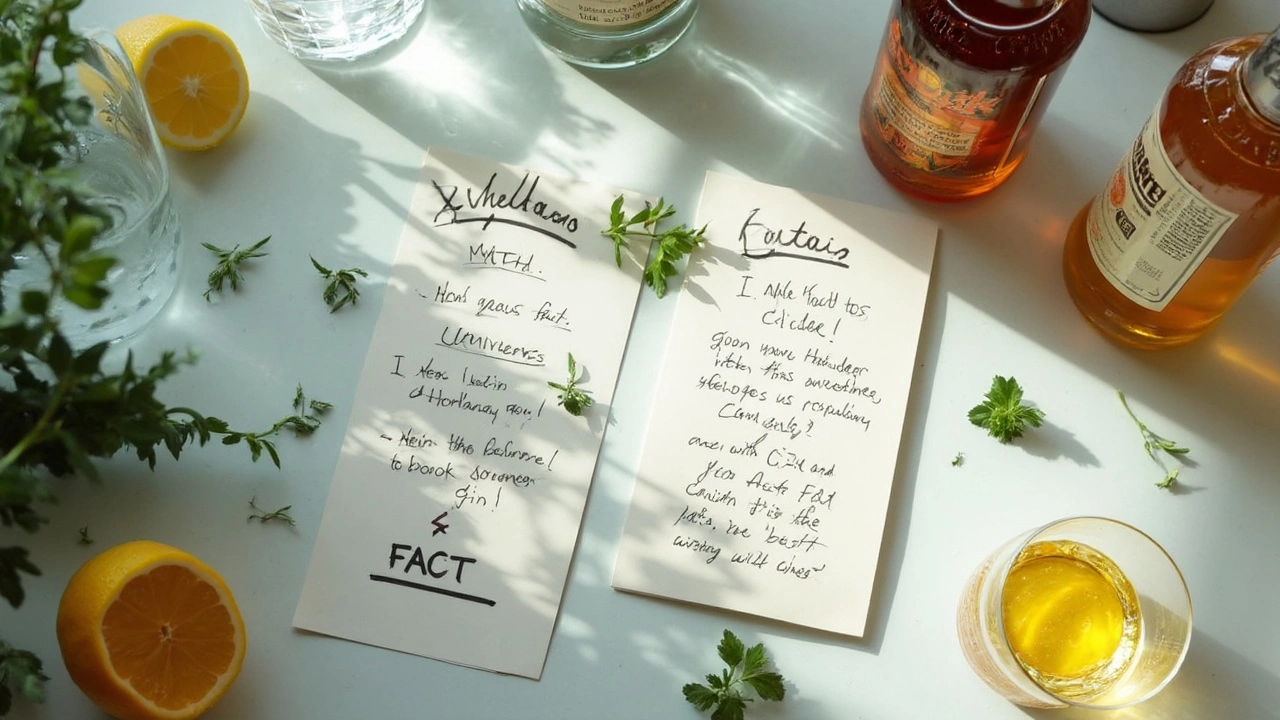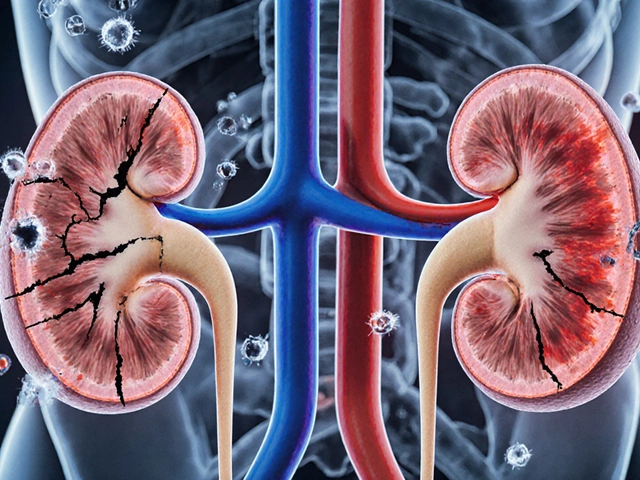Most of us don’t connect a glass of whiskey, tequila, or gin with gut health. The truth is, what you drink can actually make a difference in your digestion. Not all alcohol is equal when it comes to your gut bacteria and how your stomach feels the next day.
Lighter spirits, like vodka or gin, tend to hit your gut a bit softer than heavy, sugary cocktails or dark liquors. Some clear spirits have fewer ingredients that can upset your system, and a simple seltzer mixer can help keep things easy on digestion. If you’re looking to avoid the bloating, gas, or other gut drama, knowing which spirits go down smoother might just help.
It’s not about giving up fun or skipping drinks—just making choices that don’t leave your belly in a mess. Stick around for some science-backed tips, honest comparisons, and myths you’ll want to ignore at your next tasting or party.
- How Alcohol Affects Your Gut
- The Gut-Friendliest Spirits
- Tips for Healthier Drinking
- Myths About Alcohol and Digestion
How Alcohol Affects Your Gut
Downing a drink now and then is part of life for lots of folks, but your gut doesn’t always love it. Alcohol kicks off a chain reaction in your stomach and intestines not just during the party, but hours (or even days) afterward.
Here’s the real deal: alcohol can mess with the natural balance of bacteria in your gut. This crew of bacteria keeps your digestion running smoothly, helps break down food, and even supports your immune system. Knock things out of whack, and you might deal with bloating, gas, or worse—diarrhea and inflammation.
Forget the old “beer before liquor, never been sicker” line—studies have found all alcohol can change gut bacteria, but some hit harder than others. Drinking a lot or drinking often increases harmful bacteria and dials down the good kind (like Lactobacillus). That means heavy nights out can set your gut up for problems, especially if you already have a touchy stomach.
| Alcohol Effect | Impact on Your Gut |
|---|---|
| Raises bad bacteria | Increased risk of inflammation |
| Lowers good bacteria | Possible digestion issues |
| Speeds up gut lining damage | Can cause leaky gut (more belly pain) |
Want to sidestep a gut meltdown? Alcohol also makes it harder for your body to absorb important vitamins and minerals—think B vitamins and zinc. This adds up if you drink a lot or often chase your shots with junk food.
- Limit drinks to a few per week to let gut bacteria recover.
- Mix with plenty of water—dehydration makes everything worse.
- Light, clear alcohols tend to be less rough on your digestive system than sugary or dark drinks.
The gut health picture isn’t all bad—one glass here and there won’t ruin you. But regular overindulgence? That’s a recipe for more than just a hangover.
The Gut-Friendliest Spirits
Some spirits wreak less havoc on your gut than others. If you want to enjoy a drink without setting your stomach on fire, the difference is in the details—what the spirit’s made from, what gets added, and how your body processes it.
Gut health experts often point to clear spirits like vodka, gin, and tequila as the easiest options for your digestive system. Why? These are usually lower in sugar, contain fewer added chemicals, and have minimal gluten or potential allergens. This makes them less likely to mess with your gut microbiome or trigger issues if you have a sensitive stomach.
| Spirit | Sugar Content | Known Additives | Likely Gut Impact |
|---|---|---|---|
| Vodka | None | Very few | Mild |
| Gin | None | Herbs, but pure forms are clean | Mild |
| Tequila (100% agave) | Low | Minimal in pure brands | Gentle |
| Rum (dark, flavored) | High | Often added sugars | Harder on gut |
| Whiskey/Bourbon | Low | Possible gluten and congeners | Moderate |
Pure tequila, made from 100% agave, is especially promising. Some early research from a Mexican university spotted that certain agave sugars (called agavins) can act as prebiotics in tiny amounts—meaning they could encourage healthy gut bacteria growth. Don't expect tequila to replace your kombucha, but for spirits, it’s a better choice.
Vodka is another safe bet. Since it’s distilled multiple times, there are fewer impurities left to upset your stomach. Just skip the flavored or cheap brands loaded with artificial junk.
Clear gins are similar—juniper and botanicals don’t usually bother your gut, unless you've got rare allergies. Stick to reputable brands with cleaner ingredient lists.
“Pure, unflavored spirits are the least likely to cause gastrointestinal issues compared to dark liquors or liqueurs, which contain sugars or other additives,” said Dr. Niket Sonpal, gastroenterologist, in an interview with Health.com.
If you add sugary mixers (think cola, tonic with extra sugar, creamy liqueurs), you’re dumping in more headache for your gut. Try swapping to seltzer water or plain citrus juice. Remember, a lighter mixer is usually way easier on digestion.
Bottom line? Go clear, keep it simple, drink in moderation—and your gut will thank you in the morning.

Tips for Healthier Drinking
If you're thinking about your gut health but don't want to skip social drinks, a few smart moves can make all the difference. Let’s skip the guesswork and get straight to what works.
- Go for Clear Spirits: Vodka, gin, and tequila blanco tend to have fewer additives and are less likely to mess with your gut compared to darker liquors like rum or bourbon. The less extra stuff in your drink, the easier it is on digestion.
- Watch the Mixers: Sugary sodas, energy drinks, and even many fruit juices can spike your sugar intake and feed the wrong gut bacteria. Try soda water, unsweetened iced tea, or a splash of real citrus instead. You'll sidestep extra calories too.
- Watch Portion Size: Stick with standard serving sizes—a shot is 1.5 ounces. Big sugary cocktails are easy to overdo, and your stomach will thank you for keeping things simple.
- Hydrate Often: Alcohol is dehydrating, and that can give your belly more trouble. Try matching every drink with a glass of water. Sounds basic, but it works.
- Eat Before You Sip: Having some food in your stomach slows down alcohol absorption. Reach for fiber-rich options like whole-grain bread, veggies, or beans. These help keep blood sugar steady and support healthy gut bacteria.
- Stick to a Few Drinks: Too much alcohol slows digestion and wipes out healthy bacteria. Set a limit before you start and tell a friend. Keeps you honest.
Following these steps doesn't just leave you feeling better; it helps keep your gut in balance so you can enjoy a night out without paying for it the next day.
Myths About Alcohol and Digestion
There’s a lot of talk out there about booze and your stomach, but not all of it adds up. Some claims are just plain wrong, while others have a little truth but get twisted. Let’s break down what’s real and what’s just barstool advice gone wild.
First off, people love to say that strong spirits "kill all the bad bacteria" in your gut. Sounds cool, but science doesn’t actually back that up. Sure, alcohol can disinfect a countertop, but once you swallow it, your body’s got a way more complicated system. According to Dr. Tim Spector, Professor of Genetic Epidemiology at King’s College London,
“Alcohol at the levels found in drinks won’t sterilize your gut—if anything, too much can mess up the balance and irritate your digestive system.”
Here are some popular myths—busted:
- Myth: "Clear alcohol is always better for gut health." Not exactly. While clear spirits like vodka may have fewer additives, any alcohol in excess can upset your stomach and affect your gut bacteria. Moderation matters way more than color.
- Myth: "Wine helps digest heavy meals." Fact: Red wine does have polyphenols that might be good for your gut microbes. But drinking a lot just because you ate a steak can ruin digestion instead of helping it. Sipping slowly? Sure. Downing half a bottle? Not so smart.
- Myth: "Alcohol helps with stomach bugs." Nope. Drinking alcohol to "kill germs" when you’re sick could actually make symptoms worse by irritating your gut lining.
If you’re looking for real data, check this out:
| Beverage Type | Impact on Gut Bacteria (from clinical studies) | Irritation Risk |
|---|---|---|
| Red Wine | Can slightly increase microbial diversity if consumed moderately | Low to Medium |
| Clear Spirits (Vodka, Gin) | Little direct effect—less sugar/additives | Medium |
| Beer | Can cause bloating due to carbonation and residual carbs | Medium to High |
| High-Sugar Cocktails | Can feed harmful gut bacteria | High |
The big takeaway? When it comes to gut health, moderation trumps myths. You can enjoy your favorite spirit, just don’t fall for claims that drinking more will "help" your digestion. Pay attention to your own body—it’ll let you know if something’s not right.


